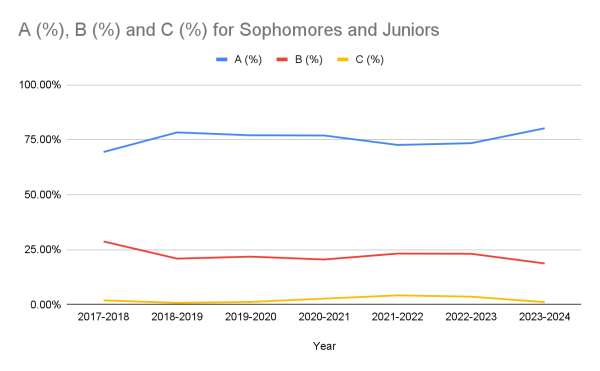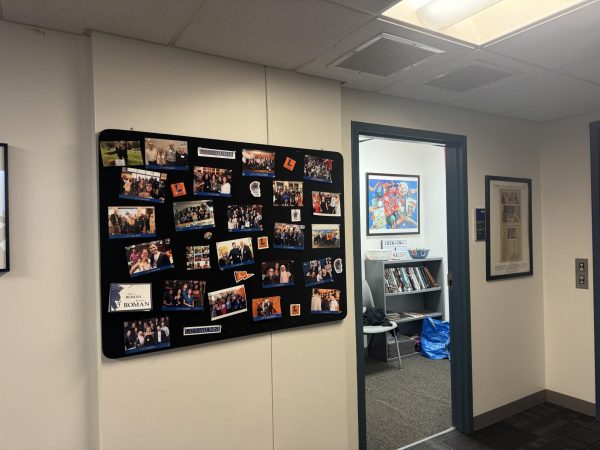Too Few Girls Doesn’t Add Up: The Gender Disparity in Latin’s Accelerated Math Classes
Latin’s Upper School is roughly evenly split between people who identify as female and people who identify as males—both students and math teachers—yet girls are underrepresented in the highest level math classes for each grade.
There are currently no sophomore girls enrolled in Honors Accelerated Pre-Calculus and Differential Calculus this year, which is the highest math class sophomores can take. In order to be eligible for Honors Accelerated Pre-Calc, a student needs to have completed Honors Geometry. There were 16 sophomores who took Honors Geometry last year as freshmen; only three students in that cohort were girls. Of the 16 sophomores, seven boys moved on from Honors Geometry to take Honors Accelerated Pre-Calc this year. No girls moved up.
While it is not yet known how many current freshman girls will decide to take Honors Accelerated Pre-Calc next year, there are four freshman girls currently taking Honors Geometry in a class of 12 that includes eight boys. Freshman Honors Geometry student Mia Kotler is planning to take Honors Accelerated Pre-Calc next year. “I love math and like to challenge myself,” Mia said. “It is sad to not see a number of girls represented in math or have the same love as I do.”
Honors Accelerated Pre-Calc is taught by Chris van Benthuysen, affectionately known as Mr. Van. Mr. Van is the Co-Interim Chair of the Math Department and also is in charge of placement.
Getting through what is known as a “Van class” is a badge of honor. That goes for all Van classes, but especially Honors Accelerated Pre-Calc. Junior Will del Hierro, who took the class as a sophomore and is currently in AP Calculus BC, said, “Mr. Van’s Accelerated Pre-Calc class challenged me to grow from a mathematical content perspective and also as an overall student.”
There are only two junior girls enrolled in AP Calculus BC this year. AP Calculus BC is the highest math class juniors can take. There are a total of 10 juniors in AP Calculus BC and only two are girls. The two junior BC Calculus girls were the only two sophomore girls last school year in Honors Accelerated Pre-Calc. However, these two female students were part of an original cohort of five girls who took Honors Geometry their freshman year. These five female freshman Honors Geometry students were in a class with 16 freshman boys, for a total of 21 total freshman participants.
Sneha Sharma, a junior who is in AP Calc BC, said, “Ever since sixth grade, there have been at most five other girls in my math class, and that definitely discourages me from participating in class.” She continued, “I know that Latin can’t push girls up into higher math classes, but I wonder if there is a shift Latin could make to encourage girls in math and give more girls a chance to excel in the math curriculum.”
Another student in AP Calc BC, junior Elynor Starr, said, “Being a girl isn’t an identity I consider much in the context of my math class. I can’t speak for anyone else, and I know my experiences aren’t identical to others, but I personally haven’t ever felt discriminated against or treated differently than my male peers.”
“I don’t feel any less pressured to pursue high-level math than my classmates,” Elynor said. “I’ve been learning with the same group in math for years now, and I haven’t felt my experience has been any different because of my gender. There’s plenty of different identities in our class, but we all have the shared identity of wanting to succeed in math. I think that what matters most is that we all care enough to make it to our level.”
The highest-level senior math class, Multivariable Calculus, has one girl out of the four students in the class, while this year’s senior class has more female students than male students overall. Looking at the same cohort of students from the Class of 2022 who started high school on the accelerated track, there were two junior girls in BC Calculus out of five juniors. The prior year, in Honors Accelerated Pre-Calc, three of the six sophomores who took it were girls. And the year before that, in this cohort’s freshman year, eight out of 17 students in Honors Geometry were girls.
In other words, for the Class of 2022, eight girls started out in Honors Geometry as freshmen. Eight girls dropped to three as sophomores in Honors Accelerated Pre-Calc. Three girls dropped to two in BC Calculus as juniors. Finally, two female students junior year dropped to only one this year in Multivariable Calculus.
The underrepresentation of girls in accelerated math classes isn’t limited to just the most accelerated math class in each grade. According to research on this school year by co-Editor-in-Chief of The Forum Eden Raviv:
“Out of all the students taking Honors Accelerated Pre-Calculus and Differential Calculus, AP BC Calculus, and Honors Multivariable Calculus—all courses which require acceleration through the math curriculum at some point in order to be reached by senior year—only 12 out of 39 are girls. That is less than 31%, when women make up about half of the Upper School student body.”
Nichol Hooker, Co-Interim Chair of the Upper School Math Department, doesn’t shy away from acknowledging gender disparity in the Math Department. “Certainly, it’s an issue we are aware of,” Dr. Hooker said. “Representation is incredibly important to us, and it is something the department has looked at in an ongoing manner as long as I have been here, which is now eight years.” Dr. Hooker added, “We want to make [higher level classes] more accessible to girls. That’s important. That sort of gender disparity or imbalance should not exist.”
Dr. Hooker shared several strategies that the Math Department is using to increase gender parity in accelerated math classes at Latin. Starting early in the placement process is important, so Dr. Hooker and her colleagues are working with their Middle School counterparts. “It can’t be something we just look at once students are in ninth grade,” Dr. Hooker said. In addition, the Math Department will now factor in gender equity when placing female students. “Often, if we are on the fence about a female student in terms of honors placement or regular placement, we try to make that honors placement at any available opportunity,” Dr. Hooker said.
A third strategy that Latin has used is to allow students to take both Multivariable Calculus and BC Calculus at the same time senior year. While doubling up in these two accelerated classes is by all accounts a heavy workload, the ability to take these classes concurrently creates an additional pathway for students who would have been prevented from taking Multivariable because they were not in Honors Geometry as freshmen. This will allow more girls to take Multivariable and addresses one of the structural obstacles to accessing the highest accelerated class.
“That was one way that we knew structurally that we could change our system in these four years to make that path more possible for more students,” Dr. Hooker said.
While junior Ava Rosenow isn’t in the most accelerated math class for her grade, she is one of the current 12 female sophomores, juniors, and seniors on an accelerated track. Ava chose to take Honors Accelerated Pre-Calc as a junior, which will allow her access to the concurrent Multivariable/BC option next year.
“I had a frustrating experience with the math placement system in Middle School,” Ava said. In Middle School, Ava was not placed in the accelerated math track at the start of sixth grade, and as a result was not in Honors Geometry as a freshman.
The Forum‘s Managing Editor and Standards Editor Nina Burik describes in her October 4, 2019, opinion piece this Middle School placement process and its effects as the “notorious math split of sixth grade.” Students not placed into the accelerated track in Middle School are able to enroll in Honors, but they are a year behind the Middle School accelerated math students.
“Although I was happy to be in honors math in high school, I was still behind for activities like math team, where almost everyone started Geo as a freshman,” Ava said. “So when I heard about honors [accelerated], I knew that it would challenge and interest me, as well as qualify me to take AP Physics EM, and I wanted to do anything I could to get there.”
Catching up in high school to take advantage of the accelerated track is difficult but not impossible. “To a certain extent, by the time students get to high school, it’s hard to course correct. This has to be something that starts sooner than that,” Dr. Hooker said.
Ava is one of the few exceptions, as she was able to course correct in high school. “Although it is certainly difficult, and I could have taken a lower level for an easier grade and less work, I am happy with my choice, as I look forward to learning and being challenged each day, even if I have to get used to being wrong more often,” she said. “I do not plan to double up next year, due to the fact that there is no room in my schedule, plus, I am taking three science classes.”
Dr. Hooker added, “Latin is not alone in tackling this disparity. It happened at my last school. It was something we talked about there. I think some of that comes down to breaking down some of those stereotypes about girls and math. I know that there’s more that can be done and should be done.”

Matthew Kotcher ('23) is thrilled to continue to serve on The Forum as the Arts Editor and now as Director of Staff Recruitment and Development. Matthew,...
























































